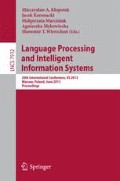Abstract
This paper deals with a problem of question type classification for Polish Question Answering (QA). The goal of this task is to determine both a general type and a class of an entity which is expected as an answer. Three types of approaches: pattern matching, WordNet-aided focus analysis and machine learning are presented and evaluated using a test set of 1137 manually classified questions from a Polish quiz TV show. Quantitative results supported with an analysis of error sources help to find possible improvements.
Access this chapter
Tax calculation will be finalised at checkout
Purchases are for personal use only
Preview
Unable to display preview. Download preview PDF.
References
Acedański, S.: A morphosyntactic Brill Tagger for inflectional languages. In: Proceedings of the 7th International Conference on Advances in Natural Language Processing (IceTAL 2010 ), pp. 3–14 (August 2010), http://dl.acm.org/citation.cfm?id=1884371.1884376
Dang, H.T., Kelly, D., Lin, J.: Overview of the TREC 2007 Question Answering track. In: Proceedings of The Sixteenth Text REtrieval Conference, TREC 2007 (2007), http://trec.nist.gov/pubs/trec16/papers/QA.OVERVIEW16.pdf
Harabagiu, S., Moldovan, D., Pasca, M., Mihalcea, R., Surdeanu, M., Bunescu, R., Gîrju, R., Rus, V., Morarescu, P.: The role of lexico-semantic feedback in open-domain textual question-answering. In: Proceedings of the 39th Annual Meeting on Association for Computational Linguistics, ACL 2001, pp. 282–289 (July 2001), http://dl.acm.org/citation.cfm?id=1073012.1073049
Hermjakob, U.: Parsing and question classification for question answering. In: Proceedings of the Workshop on Open-domain Question Answering (ODQA 2001), vol. 12 ( July 2001), http://dl.acm.org/citation.cfm?id=1117856.1117859
Karzewski, M.: Jeden z dziesięciu - pytania i odpowiedzi. Muza SA (1997)
Katz, B., Lin, J., Loreto, D., Hildebrandt, W., Bilotti, M., Felshin, S., Fernandes, A., Marton, G., Mora, F.: Integrating Web-based and corpus-based techniques for question answering. In: Proceedings of the Twelfth Text REtrieval Conference, TREC 2003 (2003), http://citeseerx.ist.psu.edu/viewdoc/summary?doi=10.1.1.111.4868
Lee, C., Wang, J.H., Kim, H.J., Jang, M.G.: Extracting Template for Knowledge-based Question-Answering Using Conditional Random Fields. In: Proceedings of the 28th Annual International ACM SIGIR Workshop on MFIR, pp. 428–434 (2005), http://citeseerx.ist.psu.edu/viewdoc/summary?doi=10.1.1.112.7960
Li, X., Roth, D.: Learning Question Classifiers. In: Proceedings of the 19th International Conference on Computational Linguistics, COLING 2002, vol. 1 (2002), http://portal.acm.org/citation.cfm?id=1072228.1072378
Maziarz, M., Piasecki, M., Szpakowicz, S.: Approaching plWordNet 2.0. In: Proceedings of the 6th Global Wordnet Conference (2012)
Przepiórkowski, A.: Slavonic information extraction and partial parsing. In: Proceedings of the Workshop on Balto-Slavonic Natural Language Processing Information Extraction and Enabling Technologies, ACL 2007 (2007), http://portal.acm.org/citation.cfm?doid=1567545.1567547
Przepiórkowski, A.: Powierzchniowe przetwarzanie języka polskiego. Akademicka Oficyna Wydawnicza EXIT, Warszawa (2008)
Sasaki, Y., Lin, C.J., Chen, K.H., Chen, H.H.: Overview of the NTCIR-6 Cross-Lingual Question Answering (CLQA) Task. In: Proceedings of NTCIR-6 Workshop Meeting (2007)
Srihari, R., Li, W.: Information Extraction Supported Question Answering. In: Proceedings of The Eighth Text REtrieval Conference (TREC-8), pp. 185–196 (1999), http://citeseerx.ist.psu.edu/viewdoc/summary?doi=10.1.1.29.5096
Woliński, M.: Morfeusz—a Practical Tool for the Morphological Analysis of Polish. In: Kłopotek, M., Wierzchoń, S., Trojanowski, K. (eds.) Intelligent Information Processing and Web Mining, pp. 511–520 (2006)
Author information
Authors and Affiliations
Editor information
Editors and Affiliations
Rights and permissions
Copyright information
© 2013 Springer-Verlag Berlin Heidelberg
About this paper
Cite this paper
Przybyła, P. (2013). Question Classification for Polish Question Answering. In: Kłopotek, M.A., Koronacki, J., Marciniak, M., Mykowiecka, A., Wierzchoń, S.T. (eds) Language Processing and Intelligent Information Systems. IIS 2013. Lecture Notes in Computer Science, vol 7912. Springer, Berlin, Heidelberg. https://doi.org/10.1007/978-3-642-38634-3_7
Download citation
DOI: https://doi.org/10.1007/978-3-642-38634-3_7
Publisher Name: Springer, Berlin, Heidelberg
Print ISBN: 978-3-642-38633-6
Online ISBN: 978-3-642-38634-3
eBook Packages: Computer ScienceComputer Science (R0)

